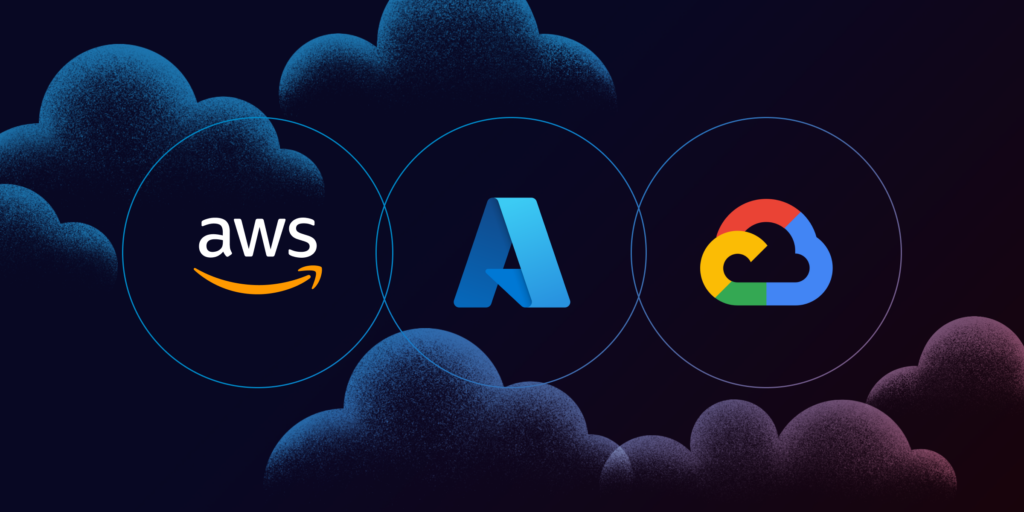Choosing the right cloud service provider is a critical decision for businesses and developers alike. With giants like Amazon Web Services (AWS), Microsoft Azure, and Google Cloud Platform (GCP) dominating the market, it’s essential to understand the nuances of each to make an informed choice. In this blog post, we’ll dive into the strengths and weaknesses of AWS, Azure, and Google Cloud, helping you determine which might be the best fit for your needs.
AWS: The Veteran Powerhouse

Amazon Web Services (AWS) is often regarded as the leader in the cloud computing space. Launched in 2006, AWS has had a significant head start and has developed a vast and mature ecosystem of services.
Pros of AWS
- Comprehensive Services: AWS offers an extensive array of services, ranging from computing power and storage to machine learning and artificial intelligence. If you need it, AWS likely has it.
- Global Reach: AWS has the largest global footprint with data centers in numerous regions and availability zones. This ensures high availability and redundancy.
- Market Leader: As the most widely adopted cloud platform, AWS has a robust community and a wealth of resources, including documentation, forums, and third-party integrations.
- Innovation: AWS consistently leads in innovation, regularly introducing new services and features.
Cons of AWS
- Complex Pricing: AWS’s pricing model can be confusing, with various factors affecting costs. Estimating expenses can be challenging without detailed analysis.
- Overwhelming Options: The vast number of services and configurations can be daunting, especially for beginners. It may take significant time to navigate and utilize AWS effectively.
- Cost: While AWS offers a free tier, it can become expensive as your usage scales, especially without proper cost management practices.
Azure: The Enterprise Favorite

Microsoft Azure, launched in 2010, has quickly gained popularity, particularly among enterprises. Leveraging Microsoft’s strong presence in the enterprise sector, Azure seamlessly integrates with many existing Microsoft products.
Pros of Azure
- Integration with Microsoft Products: Azure offers excellent integration with Microsoft software like Windows Server, Active Directory, and Office 365. This is a significant advantage for businesses already using Microsoft’s ecosystem.
- Hybrid Cloud Solutions: Azure excels in hybrid cloud scenarios, allowing businesses to connect on-premises infrastructure with cloud resources seamlessly.
- Enterprise Focus: Azure’s solutions are tailored for enterprise needs, providing robust security, compliance, and governance capabilities.
- Developer Tools: Azure supports a wide range of programming languages and frameworks and offers comprehensive tools like Visual Studio for development and deployment.
Cons of Azure
- Learning Curve: Like AWS, Azure’s vast array of services can be overwhelming, and mastering the platform requires a steep learning curve.
- Less Mature Ecosystem: Although rapidly growing, Azure’s ecosystem is not as mature as AWS, leading to fewer third-party integrations and community resources.
- Regional Availability: Azure’s global reach is extensive but not as widespread as AWS. Depending on your location, this might affect latency and availability.
Google Cloud: The Innovator’s Choice

Google Cloud Platform (GCP) may be the youngest of the three, launched in 2011, but it has quickly established itself as a strong contender. Known for its data analytics and machine learning capabilities, GCP is favored by startups and data-centric companies.
Pros of Google Cloud
- Data Analytics and AI: GCP excels in big data, machine learning, and artificial intelligence. Services like BigQuery and TensorFlow are industry-leading.
- User-Friendly Pricing: GCP’s pricing model is often simpler and more transparent than AWS and Azure. It also offers strong discounts for long-term usage and sustained use.
- Open Source Commitment: Google has a strong commitment to open source technologies, which can be a significant advantage for businesses leveraging open source solutions.
- Performance: GCP often leads in performance metrics, particularly in data processing and storage, making it ideal for data-intensive applications.
Cons of Google Cloud
- Market Share and Ecosystem: GCP’s market share is smaller compared to AWS and Azure, leading to fewer third-party services and a smaller community.
- Enterprise Features: While improving, GCP’s enterprise features are not as robust as those offered by AWS and Azure, particularly in areas like compliance and governance.
- Global Reach: GCP’s data center footprint is growing but is still not as extensive as AWS, which might affect global availability and redundancy.
Which Cloud Platform is Right for You?

Choosing the right cloud platform depends on your specific needs, goals, and existing infrastructure.
For Startups and Small Businesses
Startups and small businesses often benefit from the flexibility and cost-effectiveness of GCP. Its strong data analytics capabilities, transparent pricing, and commitment to open source make it an attractive option. Additionally, GCP’s performance in data processing can provide a competitive edge for data-centric applications.
For Enterprises and Businesses with Existing Microsoft Infrastructure
Enterprises heavily invested in Microsoft products may find Azure to be the natural choice. The seamless integration with existing Microsoft software, robust enterprise features, and excellent hybrid cloud capabilities make Azure a compelling option. Its focus on enterprise needs ensures a smooth transition and operation within the cloud.
For Versatility and Comprehensive Services
For those needing the broadest range of services and a mature, reliable platform, AWS is hard to beat. Its extensive service offerings, global reach, and market leadership make it suitable for various use cases, from startups to large enterprises. AWS’s innovation and continuous introduction of new features ensure that users always have access to cutting-edge technologies.
Conclusion
In the end, there is no one-size-fits-all answer when it comes to choosing between AWS, Azure, and Google Cloud. Each platform has its strengths and weaknesses, and the best choice depends on your unique requirements. Carefully consider factors like your existing infrastructure, the specific services you need, and your budget to make an informed decision. With the right choice, your business can harness the power of cloud computing to drive innovation and growth.

